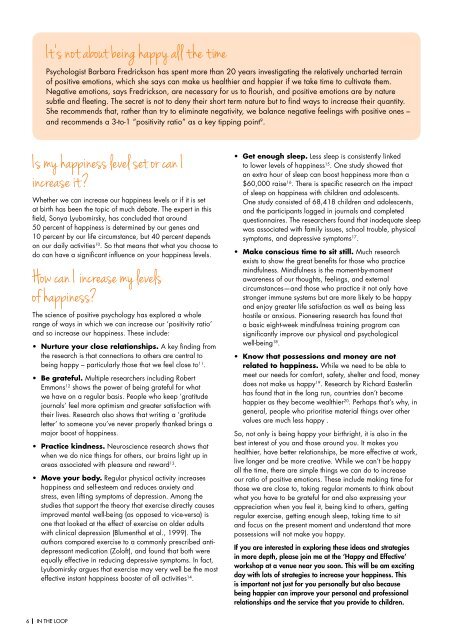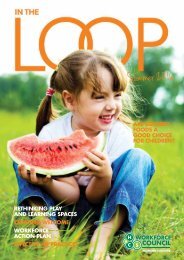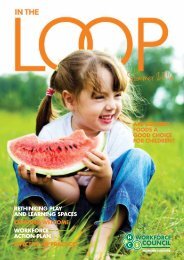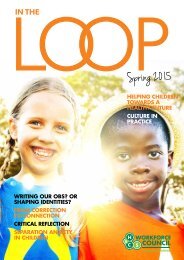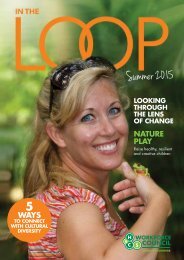Winter 2015
You also want an ePaper? Increase the reach of your titles
YUMPU automatically turns print PDFs into web optimized ePapers that Google loves.
It’s not about being happy all the time<br />
Psychologist Barbara Fredrickson has spent more than 20 years investigating the relatively uncharted terrain<br />
of positive emotions, which she says can make us healthier and happier if we take time to cultivate them.<br />
Negative emotions, says Fredrickson, are necessary for us to flourish, and positive emotions are by nature<br />
subtle and fleeting. The secret is not to deny their short term nature but to find ways to increase their quantity.<br />
She recommends that, rather than try to eliminate negativity, we balance negative feelings with positive ones –<br />
and recommends a 3-to-1 “positivity ratio” as a key tipping point 9 .<br />
Is my happiness level set or can I<br />
increase it?<br />
Whether we can increase our happiness levels or if it is set<br />
at birth has been the topic of much debate. The expert in this<br />
field, Sonya Lyubomirsky, has concluded that around<br />
50 percent of happiness is determined by our genes and<br />
10 percent by our life circumstance, but 40 percent depends<br />
on our daily activities 10 . So that means that what you choose to<br />
do can have a significant influence on your happiness levels.<br />
How can I increase my levels<br />
of happiness?<br />
The science of positive psychology has explored a whole<br />
range of ways in which we can increase our ‘positivity ratio’<br />
and so increase our happiness. These include:<br />
• Nurture your close relationships. A key finding from<br />
the research is that connections to others are central to<br />
being happy – particularly those that we feel close to 11 .<br />
• Be grateful. Multiple researchers including Robert<br />
Emmons 12 shows the power of being grateful for what<br />
we have on a regular basis. People who keep ‘gratitude<br />
journals’ feel more optimism and greater satisfaction with<br />
their lives. Research also shows that writing a ‘gratitude<br />
letter’ to someone you’ve never properly thanked brings a<br />
major boost of happiness.<br />
• Practice kindness. Neuroscience research shows that<br />
when we do nice things for others, our brains light up in<br />
areas associated with pleasure and reward 13 .<br />
• Move your body. Regular physical activity increases<br />
happiness and self-esteem and reduces anxiety and<br />
stress, even lifting symptoms of depression. Among the<br />
studies that support the theory that exercise directly causes<br />
improved mental well-being (as opposed to vice-versa) is<br />
one that looked at the effect of exercise on older adults<br />
with clinical depression (Blumenthal et al., 1999). The<br />
authors compared exercise to a commonly prescribed antidepressant<br />
medication (Zoloft), and found that both were<br />
equally effective in reducing depressive symptoms. In fact,<br />
Lyubomirsky argues that exercise may very well be the most<br />
effective instant happiness booster of all activities 14 .<br />
• Get enough sleep. Less sleep is consistently linked<br />
to lower levels of happiness 15 . One study showed that<br />
an extra hour of sleep can boost happiness more than a<br />
$60,000 raise 16 . There is specific research on the impact<br />
of sleep on happiness with children and adolescents.<br />
One study consisted of 68,418 children and adolescents,<br />
and the participants logged in journals and completed<br />
questionnaires. The researchers found that inadequate sleep<br />
was associated with family issues, school trouble, physical<br />
symptoms, and depressive symptoms 17 .<br />
• Make conscious time to sit still. Much research<br />
exists to show the great benefits for those who practice<br />
mindfulness. Mindfulness is the moment-by-moment<br />
awareness of our thoughts, feelings, and external<br />
circumstances—and those who practice it not only have<br />
stronger immune systems but are more likely to be happy<br />
and enjoy greater life satisfaction as well as being less<br />
hostile or anxious. Pioneering research has found that<br />
a basic eight-week mindfulness training program can<br />
significantly improve our physical and psychological<br />
well-being 18 .<br />
• Know that possessions and money are not<br />
related to happiness. While we need to be able to<br />
meet our needs for comfort, safety, shelter and food, money<br />
does not make us happy 19 . Research by Richard Easterlin<br />
has found that in the long run, countries don’t become<br />
happier as they become wealthier 20 . Perhaps that’s why, in<br />
general, people who prioritise material things over other<br />
values are much less happy .<br />
So, not only is being happy your birthright, it is also in the<br />
best interest of you and those around you. It makes you<br />
healthier, have better relationships, be more effective at work,<br />
live longer and be more creative. While we can’t be happy<br />
all the time, there are simple things we can do to increase<br />
our ratio of positive emotions. These include making time for<br />
those we are close to, taking regular moments to think about<br />
what you have to be grateful for and also expressing your<br />
appreciation when you feel it, being kind to others, getting<br />
regular exercise, getting enough sleep, taking time to sit<br />
and focus on the present moment and understand that more<br />
possessions will not make you happy.<br />
If you are interested in exploring these ideas and strategies<br />
in more depth, please join me at the ‘Happy and Effective’<br />
workshop at a venue near you soon. This will be am exciting<br />
day with lots of strategies to increase your happiness. This<br />
is important not just for you personally but also because<br />
being happier can improve your personal and professional<br />
relationships and the service that you provide to children.<br />
6<br />
IN THE LOOP


